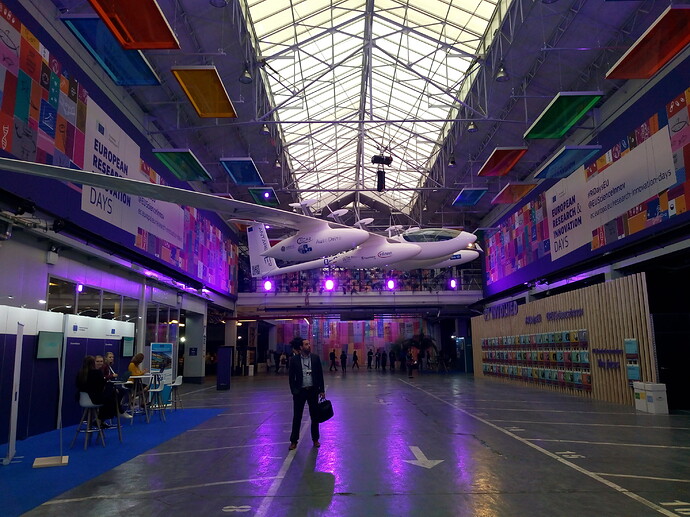The first edition of the European Research and Innovations Days took place in Brussels (24-26 September) in the wonderful space of Kanal – Centre Pompidou. More than 3,000 people attended the sessions each day. This huge event consisted of the Policy Conference (125 sessions); the Innovative Europe Hub for innovators, entrepreneurs and researchers mostly focusing on the EIC (European Innovation Council) Pilot; and the Science is Wonderful Exhibition showcasing impressive work of researchers funded under Marie Skłodowska-Curie Actions and other EU funds. Our very own @MariaEuler was one of them, presenting her Gallery of Quantum Teleported Artworks and the interactive sculpture based on magnetism quite interesting to discover and experience.
At the opening session, the Commissioner Carlos Moedas compared the situation in 2014 when the words like “open science” were vague with nowadays when we refer to open data and open access as part of our European values. “Open innovation is about inclusiveness and disruption” – his promise is to make the Horizon Europe a co-created enabling program.
One is true, this EU event was trying to be different in the sense that participants were given the opportunity to shape the priorities for the first phase of Horizon Europe implementation and help make sure it best fits the needs of citizens. This was possible through the Horizon Village – 21 stands with the EU staff ready to discuss and listen to do’s and don’ts for the specific policy topic. As Director-General of the DG RTD Jean-Eric Paquet said, the Commission is making an effort to change their usual way of working. ![]()
A few points from some of the sessions of the Policy Conference:
-
Better services for project proposers – the National Contact Points (NCPs) and the Enterprise Europe Network (EEN) discussed methodologies and services for participants. EEN offers broad range of services for SMEs including building partnerships for Horizon2020 calls – it might be something we should consider in addition to our standard process of searching for partners. I’ll also monitor their events as sometimes they also organize meetings for project proposers. EEN collaborates closely with the NCPs and in the future Horizon Europe they will try to improve their services based on the feedback from the researchers. Those in the audience complained the NCPs often do not have sufficient expertise and aren’t of much use when it comes to answering more specific questions. @alberto do you have any experience with the Estonian NCP (Estonian Research Council)?
-
Preserving the EU values while harnessing digital progress – (if we can actually agree on what these values are) it requires ecosystem collaboration - interdisciplinary approach going beyond the technology itself, human centric, data driven and trust based EU data economy. Eric Hardouin, the director of the Ambient Connectivity research domain of Orange Labs: “the EU policies could support the NGI vision by putting the public interest and societal value in front, together with the challenges, to create the trust framework on which the private sector can develop their data sharing policies”.
-
The promise of Citizen Science – what is needed from governments, research organisations and others to maximise its potential? Wolfgang Burtscher (DG RTD): “We are convinced that the citizen science is an important tool to improve the science drawing on collective intelligence.” It seems that in the new Horizon Europe, citizen science will have an important place with more dedicated funding. Speakers presented some of their CS projects such as Rosa Arias from Science for Change which is developing user-centered, innovative services and products based on citizen science; or Mordechai Haklay (UCL) who talked about the EU Citizen Science Platform (hosted by the Citizen Science Association) - a project started in January this year aiming to become a mutual learning space; the publication Innovation in Open Science, Society and Policy and the Extreme Citizen Science blog. Some of these might be useful for our preparation of Swafs applications.
Other points to note:
- A novelty for innovation support: Innovation Fund is focusing on innovative low-carbon technologies. First call for projects will be launched next year.
- European Investment Project Portal for matchmaking could be useful if you are looking for investors.
During these Days we’ve heard a lot about how the US or China are investing much more than the EU does in research and innovation. In this competition, the EU investment goes from 80 billion to 100 billion expected for the Horizon Europe. The public consultation is still open until 4th of October.
Video recordings of the sessions are available here.
